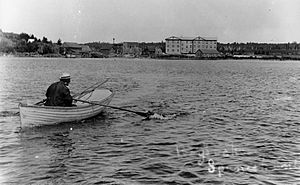Basil H. Johnston facts for kids
Quick facts for kids
Basil Johnston
|
|
|---|---|
| Born | July 13, 1929 Parry Island Indian Reserve |
| Died | September 8, 2015 (aged 86) Wiarton, Ontario |
| Notable awards | Order of Ontario, Stephen Leacock Memorial Medal for Humour |
Basil H. Johnston OOnt was an important Anishinaabe (Ojibwa) writer, storyteller, and teacher from Canada. He worked hard to share and protect the Ojibwa language and culture. He was born on July 13, 1929, and passed away on September 8, 2015.
Contents
Life of Basil Johnston
Early Life and Education
Basil Johnston was born on July 13, 1929. His birthplace was the Parry Island Indian Reserve. His parents were Rufus and Mary Johnston. He was a member of the Chippewas of Nawash Unceded First Nation. This community is located in the Bruce Peninsula.
Basil went to reserve schools in Cape Croker. Later, he and his sister Marilyn were sent to a residential school. This was the St. Peter Claver School for Boys in Spanish, Ontario. He wrote about his experiences at this school. His book, Indian School Days, came out in 1988.
After high school, Basil was the top student in his class. He then earned a degree from Loyola College in 1954. In 1962, he also got a teaching certificate. In 1959, he married Lucie Desroches. They had three children together: Miriam, Tibby, and Geoffery.
Basil Johnston passed away in 2015 in Wiarton, Ontario. Before he died, he gave his writings and photos to McMaster University Library. This helps researchers learn more about his work.
Teaching and Cultural Work
Basil Johnston taught high school from 1962 to 1969. He then joined the Royal Ontario Museum in Toronto. He worked there for 25 years. A big part of his job was to help bring back the Anishinaabe language and traditions.
He created many Ojibwa language courses. These were available on tape and in print. He believed that learning the traditional language was key. It helped people understand Indigenous culture. In an essay from the 1990s, he wrote about how important Indigenous languages are. He said that losing a language means losing a way of thinking and feeling. It means losing the wisdom of ancestors.
Basil Johnston's Writings
Basil Johnston wrote many books, articles, and poems. He wrote in both English and Ojibwa. At first, publishing companies were unsure about his work. They wondered if enough people would buy his books.
His first book, Ojibway Heritage, was published in 1976. This happened with help from Jack McClelland and Anna Porter. In 1978, Anna Porter also helped publish his second book. This book was called Moose Meat and Wild Rice. It was a collection of 22 funny short stories. The book made fun of the relationships between Indigenous peoples and government officials. It also looked at how cultures mix. This book was nominated for a special award for humor.
Awards and Recognition
Basil Johnston received many awards for his efforts. These awards recognized his work in saving the Ojibwa language and culture. He also received special honorary degrees from several universities.
Some of his awards include:
- Order of Ontario (1989)
- 125th Anniversary of the Confederation of Canada Medal (1992)
- National Aboriginal Achievement Award for Heritage and Spirituality (2004)
- Debwewin Citation for excellence in storytelling (2012)
- Ontario Arts Council Aboriginal Arts Award (2013)
- National Aboriginal Achievement Award for Heritage and Spirituality (2014)
Film Projects
Basil Johnston also worked on films. He helped create movies that shared Indigenous stories.
- The Man, the Snake and the Fox. This film was made in 1978. Basil Johnston wrote the story for it.
- Native Indian folklore. This film was made in 1993. Basil Johnston was one of the people who worked on it.
 | Frances Mary Albrier |
 | Whitney Young |
 | Muhammad Ali |


